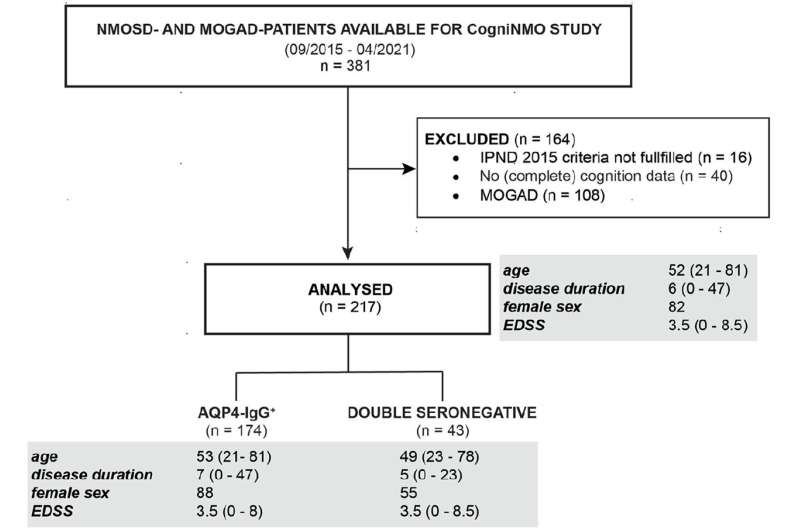This article has been reviewed according to Science X's editorial process and policies. Editors have highlighted the following attributes while ensuring the content's credibility:
fact-checked
proofread
NMOSD patients: Less cognitive impairment than previously assumed

In a large study led by the MHH neurology department, researchers investigated the cognition of patients with the rare disease NMOSD. It was found that about 20 percent of those affected have limited cognitive abilities.
People with the rare neuromyelitis optica spectrum disease (NMOSD) have severe physical and psychological impairments. But do they also suffer from limitations in their cognitive abilities? Neurologists investigated this in the CogniNMO study. A total of 17 treatment centers specialized in the disease in Germany took part. Professor Dr. Corinna Trebst and Dr. Martin Hümmert from the Department of Neurology at the Hannover Medical School (MHH) led the study. The results were published in the Multiple Sclerosis Journal.
So far no clear statements on cognitive abilities
There are a few thousand people with NMOSD in Germany. This is a rare autoimmune disease that causes relapsing inflammations of the central nervous system. Those affected suffer from limitations such as impaired vision, paralysis, incontinence and pain. "Whether their cognitive abilities are also reduced has not been clear until now. Studies had delivered different and partly contradictory results on this," Professor Trebst says.
Cognitive abilities are various processes that serve the perception and processing of information. These include attention, thinking and memory capacity. "We wanted to find out how many people affected have cognitive impairments, what kind they are, whether they occur in connection with a disease flare, depression or fatigue symptoms or depend on other factors, for example the presence of autoantibodies," explains Dr. Hümmert. In addition, the long-term course of cognitive abilities was to be examined for the first time worldwide.
Limitations compared to the average population
The results of the CogniNMO study show that people with NMOSD score worse in visual processing speed and word fluency compared to the average population. "However, the frequency of cognitive impairment, at around 20 percent in at least two cognition tests, is much lower than assumed from previous studies," explains Professor Trebst.
The cognitive impairments are not related to disease relapses or to the presence of an antibody against aquaporin 4, a water channel on the astrocytes (supporting cells) of the nervous system, which can be detected in 80 percent of NMOSD sufferers. "Furthermore, cognition performance is completely independent of depression or fatigue symptomatology," Dr. Hümmert notes. A deterioration of cognitive abilities within two years was also not observed. In summary, the study provided valuable information on the cognitive limitations of NMOSD patients.
Neuropsychological tests and questionnaires
The study was conducted from 2015 to 2021. The participating NEMOS centers belong to the network of the same name (see www.nemos-net.de), which is dedicated to research into NMOSD. In total, data from 217 patients were collected and analyzed.
"In order to record the cognitive abilities of the participants, three established neuropsychological tests were carried out at the centers," explains neuropsychologist Professor Dr. Bruno Kopp. "We also collected and evaluated demographic and clinical data," adds Carlotta Stern, a medical student and doctoral candidate.
The study participants took part in regular check-ups at intervals of about one year and completed the three neuropsychological tests again—this enabled the researchers to observe the cognitive abilities in the course of the disease. For the future further longitudinal studies and the expansion of the test battery are planned in the NEMOS network.
More information: Martin W Hümmert et al, Cognition in patients with neuromyelitis optica spectrum disorders: A prospective multicentre study of 217 patients (CogniNMO-Study), Multiple Sclerosis Journal (2023). DOI: 10.1177/13524585231151212




















